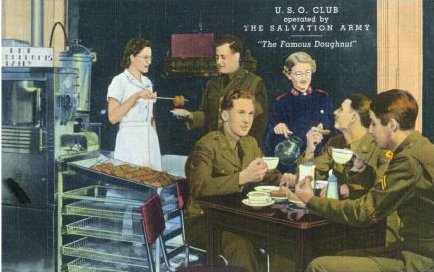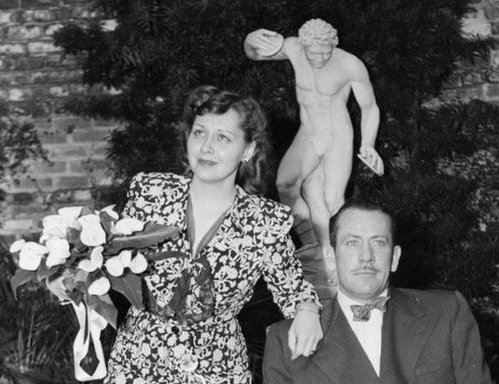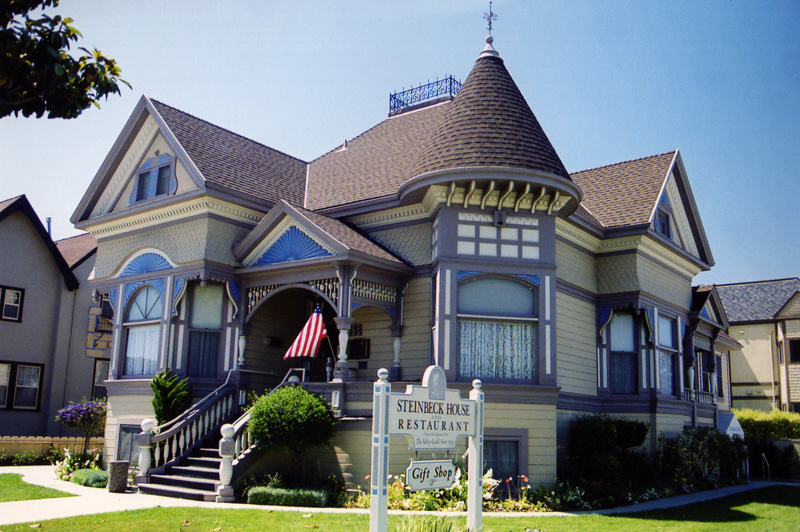Salvation Army WWII 'Doughnut Girl' Sue McLean turns 100

Story by Tom Mulinix
Planned Giving Representative
[email protected]
When you live to be 100 years old, you have seen and been a part of many historical events. Susanne (Sue) McLean of Houghton, MI was born right in the middle of World War I on June 17, 1917. Just a couple months prior in April, the United States had entered this great global conflict. The 100th year anniversary of that event is currently being recognized nationally.
Sue was a “California girl”, born and raised in the beautiful Pacific coast town of Carmel, California and lived right next to the ocean. The author R.L. Stevenson described Carmel as “The most beautiful meeting of the land and the sea.” To picture this idyllic setting, think of the legendary Pebble Beach golf course located in the Carmel area.
When Sue was 24-years-old, the United States entered into World War II. Her “paradise life” would be altered in a direction she could never have imagined at the time. The United States had a huge military base in the Carmel/Monterey area called Fort Ord that housed up to 50,000 soldiers at a time. By the time Fort Ord closed in 1994, millions of military personnel passed through its gates.
During WWI and WWII The Salvation Army had set up services to the soldiers by all the major bases located throughout the United States. This was the well-known USO (United Services Organization) which offered social outlets for the soldiers including entertainment, recreational activities and food. The most famous food served was the iconic doughnut, which The Salvation Army was credited with “inventing” during its service to soldiers during WWI.

Picture from a WWII era postcard.
During WWII, Sue and many of the other local girls served at Fort Ord as volunteer “Doughnut Girls” for the Salvation Army. It was a great way to serve their country in the war effort and provide support to all of the troops. Many of the “Doughnut Girls” in the United States were located in port cities on the East and West coast serving soldiers who were coming and going to the war theaters in Europe and Japan. Sue remembers those days fondly as they served as a pivot point for the rest of her life.

Doughnut Girls and Soldiers
Carol Steinbeck, the wife of the famous Nobel Prize and Pulitzer Prize-winning American author John Steinbeck (Of Mice and Men, The Grapes of Wrath, Cannery Row), hosted parties at the Steinbeck mansion in Monterey for the military personnel. Carol invited the Salvation Army “Doughnut Girls” to attend these functions so that the men had “nice ladies” that they could socialize with. The Doughnut Girls mingled with the soldiers, offering them food (especially doughnuts) and conversation. Sue said the conversation was the small talk employed by men and women throughout the ages to get to know each other – where are you from, what do you like, and discussions on the latest news.


“My goodness, it was wonderful to be around these clean-cut handsome young men who were eager for our attention, and they were so polite and nice!” Sue said.
Carol Steinbeck would also bring in six to seven piece orchestras to provide musical entertainment and dancing. As the couples paired off to dance, this is where the fire would grow from the initial sparks of attraction. Many of the Doughnut Girls found their future husbands at these Steinbeck parties. Sue was one of them.
Sue and Norman
“It was inevitable because the whole affair was a recipe for making a love connection," Sue said. "All of us girls looked at it as an added benefit of doing the service. I met many Army officers, but I can tell you it was the Navy officers who always caught my eye because of their dress uniforms. My goodness, when I first saw my husband Norman in his uniform – I was stricken! Norman was quite a dancer and he literally swept me off my feet as he twirled me around."
Norman was from Marquette, Michigan and served as a Navy Officer assigned to a destroyer group.
“As a California girl, I had never heard of Marquette, Michigan, nor could I even begin to imagine what a place with cold and snow was like," Sue said. "All I knew was the sun and surf of beautiful Carmel.”
One of the books of note of John Steinbeck was the book “Cannery Row” which was about the sardine industry in the Monterey area. Along with the fisherman there were the canneries to process the sardines. The canneries were so numerous they were lined up in a row. Because of the war, the government lifted all restrictions on harvesting the sardines as both the military and the public needed the small fish for meat.
“The canneries fought the war by getting the limits taken off the fish and catching them all. It was done for patriotic reasons," Steinbeck wrote.
Because of this, the sardine business boomed during the war years. When the war ended, the demand bubble burst and the over-harvesting crashed the sardine fishery. This double blow devastated the local economy as fishing businesses failed and canneries collapsed. Sue then went to work for two years with the local Salvation Army to provide help and relief to the struggling families.
“Those people were so appreciative of the help from The Salvation Army," Sue said. "The Salvation Army was just wonderful. You can’t believe everything The Salvation Army did. People were not sitting around starving; they always had food, and they always had someplace to go stay. The Salvation Army did the most wonderful job you could ever do, just perfect - they took care of a lot of people.”
Sue and Norman had gotten married in California at the end of 1942 while WWII raged on. After Norman’s Navy service ended they eventually moved to Chicago where Norman received his law degree and worked as an attorney. He wanted to return to the Upper Peninsula so they settled in Houghton.
“I was a California girl and I hate to say he took me up here kicking and screaming," Sue humoredly said. "They say you get used to the cold weather – I am still waiting for that to happen!”
Norman was an avid skier and helped coach in the 1960’s for the Michigan Tech ski team. Norman and Sue have four children and seven grandchildren. This year is also their 75th wedding anniversary. Sue is widowed and resides at the Bluff View apartments.
Happy 100th birthday to Sue!

